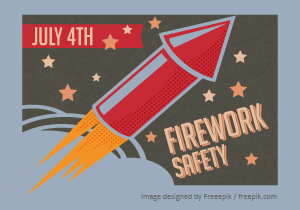
Who doesn’t love July 4th, Independence Day, a celebration of our nation’s independence and traditionally a day filled with food, family and good fun? Unfortunately, July 4th is also a holiday that can bring danger and great potential for property and casualty losses due to the negligent use of fireworks if the proper safety measures are not followed.
Unified Investigations & Sciences’ professional fire investigation experts nationwide most often find that fires resulting from negligent use of consumer fireworks involve the use of bottle rockets. A bottle rocket is a skyrocket (about two inches in length) that is attached to a stabilizing stick. They are often placed into, lit, and shot from bottles (hence the name bottle rocket). As the fuse ignites the propulsion component, the bottle rocket shoots into the air and eventually a secondary charge explodes, giving off an illuminated display and an audible “bang.” Bottle rockets are just one of many different types of fireworks, but they pose a special risk as they cannot be controlled and often fly into unintended areas such as mulched flower beds, trash piles and into woods that are dry due to the summer heat. Depending on the available fuel where the bottle rocket lands, the potential for an unintended fire is present. More times than not, these fires are not noticed immediately and grow in size before being discovered and reported.
Insurance claims professionals should be aware of the subrogation opportunities associated with the negligent use of fireworks. There may be a number of such opportunities depending on the circumstances involved. A check of local and state laws in the area where the incident occurred may find that the use of bottle rockets, and perhaps even all fireworks, is prohibited. An illegal act on the part of a third party could easily provide a liability matter that should be explored. Many states and local communities do prohibit the consumer’s use of fireworks and encourage instead that citizens view commercial events often sponsored by municipal governments or commercial businesses such as shopping malls or theme parks.
A second possibility for subrogation lies in taking a look at the actions of the person(s) using the fireworks. Perhaps they were doing so in a manner not intended. One Unified fire investigator reported that an investigation of a fire in Florida found teenagers were shooting bottle rockets at each other, more horizontally than the usual vertical manner bottle rockets are intended to be used. This led to a bottle rocket landing in an exterior trash container, which caused the container’s contents to catch fire. A thorough investigation with interviews of neighbors revealed these details and led to a liability claim against the homeowners liability coverage for one of the participant’s parents.
A third incident with a different theory of liability occurred in Missouri when a bottle rocket landed in a flower bed where recycled rubber had recently been used as mulch. In our fire investigator’s testing, a bag of the same mulch product was purchased from a home supply store and revealed that an exploding bottle rocket can ignite the rubber mulch material. The bag that the product is sold in fails to warn the consumer about this hazard, thus providing a theory of liability against the manufacturer.
If fireworks are part of your personal celebrations this July 4th, consider ground use fireworks as a much safer alternative. With proper safety procedures and use of more predictable materials, everyone should be able to have a fun-filled and safe July 4th holiday.
Michael Reynolds, IAAI-CFI, FCLS | Director of Total Performance
Unified Investigations & Sciences, Inc., a Sedgwick company